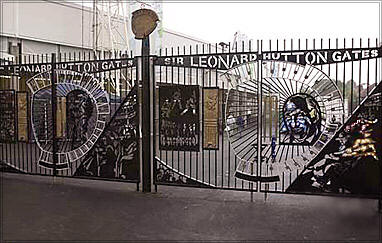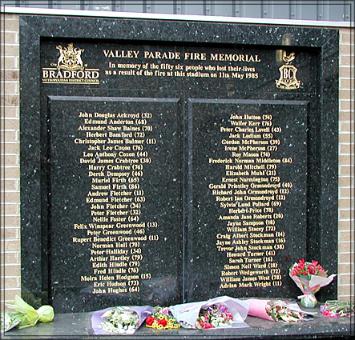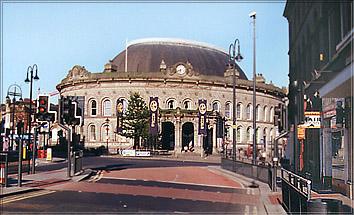SEPTEMBER 2001
Cricket is one of the things that binds Yorkshire together. Those of us with little interest in the game like to see Yorkshire win, so it was a cause for celebration at the end of August when Yorkshire won the County Championship. The last time this happened was in 1968 when trains had corridors, we used shillings and pence and no man had stood on the Moon.
|
The Headingley Test was an unexpected success for England in a series in which we were thrashed by the Australians. Political correctness and heavy security hasn’t yet totally eliminated the carnival-village fete character of the Headingley Test. Visitors to the new West Stand this year included clowns, gondoliers, Romans, classical gods and a guy dressed as a French restauranteur.
You may have read about the controversy surrounding the new gates at Headingley. Intended as a tribute to Len Hutton, they are also a monument to racial awareness and political rectitude. As Bill Carmichael wrote in the Yorkshire Post, ‘we should consider ourselves lucky that (the designer) didn’t also include the Cleckheaton Gay Men’s Chorus performing Village People’s YMCA routine in front of the Western Terrace’.
|
Sir Leonard Hutton Gates |
|
|
More seriously, a fitting
memorial to the fifty six men, women and children who died in the
Bradford City Football Club fire disaster on 11 May 1985 was quietly
unveiled recently. It is of marble and includes the names of all those
who perished on that frightful afternoon. It is outside the new Sunwin
Stand development.
Valley Parade Fire Memorial
|
In Britain only 7% of schoolchildren travel to school by bus compared with 54% in the USA. Public services are unreliable, the private bus system disorganised and parents fear for their children’s safety. So morning and evening our narrow, winding, overcrowded roads are brought to a virtual and actual standstill by parents on the school run. In the Hebden Bridge area yellow school buses are to be used to collect children from isolated hamlets and farmsteads as well as built-up areas and so provide a safe, reliable means of getting to and from school. The buses are coming from Georgia and the service starts in January. One hopes that something so socially and environmentally desirable is also a commercial success. Of course, children in the area will have absolutely no difficulty recognising the school bus; it is just like the one their friend Bart Simpson uses.
That’s not to say that everything which comes here from America is welcome. We used to say that what happened in America happened here ten years later. Now it’s much more quickly than that. Much that crosses The Pond is fine but we could have done without chewing gum, political correctness, the litigation culture and Dynasty (only made bearable by Joan Collins vamping it up). On the subject of American TV, their comedy when it’s good is very good – over the years we’ve enjoyed Happy Days, Taxi, Cheers, Friends (now past its sell-by date) and the wonderful Frasier (though that’s lost its edge since Daphne became aware of Niles’ affections).
Tanya Holland of Huddersfield has been sent a quarterly bill by Yorkshire Electricity for £2,131,474,163. The accompanying letter informed her that she could pay the debt off in instalments. So that’s alright then.
Two recent articles in the Times have provided some interesting statistics about the economic success of Leeds in recent years. (Sensitive readers in Sheffield and Bradford might like to look away now). An industrial city it certainly is not. 100,000 people, a quarter of the workforce, are now employed in financial services. This is twice the number ten years ago. It is predicted to increase by 50% over the next ten years. Call centres employ a further 17,000. There are 32 banks, 180 law firms, all the multinational accountancy firms and almost two hundred smaller ones. Manufacturing accounts for just 13% of jobs in Leeds.
| In the past ten years £2.5 billion has been spent on building schemes in the city centre. This autumn another major redevelopment for multi-use in the heart of Leeds on the Headrow will open. It is proposed to spend a further £2.4 billion. New offices open every month. The station has been transformed. The city has been hard wired. ‘Northern capital’ and ‘England’s second city’ gushes the Times. GDP ten years ago was £7.3 billion, is now £10 billion and is expected to grow by a further 30% in the next ten years. These figures are difficult to understand but they back up what those of us who work in Leeds know; it is boom town at present. The skyline is dominated by cranes and ambitious new buildings. The city is being overhauled. |
The Corn Exchange, Leeds |
Scores of new bars, clubs, restaurants and cafes characterise the evening scene. There are 90,000 students in Leeds as well as a large population of affluent twenty and thirty somethings. Visitors come for shopping and clubbing. Ten years ago there were 800 hotel rooms in Leeds; soon there will be 4000. Ten years ago 20 families lived in the city centre, today 10,000 have city centre addresses in smart expensive apartments, many beside the river in transformed warehouses and industrial buildings. ‘Manhattan-style environment’ (the Times) is a little over the top for a Yorkshireman but the point is made.
Leeds has repositioned itself. The Leeds Keith Waterhouse wrote of is largely gone apart from the rich architectural legacy. And the ordinary people – I use the term as a badge of honour – remain the same and greet you with ‘You alright, then?’ and leave with the valedictory ‘See you later’ even if you are never going to see them again in your life.
I knew that 1 August was Yorkshire Day but I didn’t know why. In Asda supermarkets on Yorkshire Day this year, customers were given a leaflet which explained it. Apparently the date had special significance because in 1756 Yorkshire regiments fighting at the Battle of Minden in Westphalia picked white roses from the hedgerows as a tribute to their fallen colleagues. Yorkshire regiments began the practice of wearing white roses on 1 August to honour the bravery of fallen Yorkshire soldiers.



